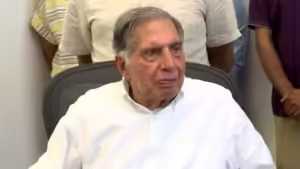Why Ratan Tata Passed Away: A Look at His Health Journey and Legacy

The recent passing of Ratan Tata on October 9, 2024, has sent shockwaves through India and the global business community. As the former chairman of the Tata Group, Tata was not only a titan of industry but also a philanthropist whose contributions extended far beyond the boardroom. At the age of 86, he succumbed to age-related health issues, marking the end of an era for one of India’s most respected figures.
Health Journey Leading to His Passing
In the days leading up to his death, Ratan Tata was admitted to Breach Candy Hospital in Mumbai due to age-related complications. Initially, he underwent routine check-ups, and on October 7, he reassured the public via social media that there was “no cause for concern” regarding his health. However, reports indicated that his condition deteriorated rapidly, leading to his admission to the ICU shortly before his passing. Despite efforts from medical staff, he could not be saved .Tata’s health had been a topic of speculation in recent weeks, with various reports circulating about his condition. While he addressed rumors directly by stating that he was simply undergoing medical check-ups, the reality of his declining health was more serious than initially conveyed. His death has prompted discussions about the challenges faced by aging leaders in high-stakes industries .
A Legacy of Leadership and Philanthropy
Ratan Tata’s contributions to Indian business are monumental. Under his leadership from 1991 to 2012, the Tata Group expanded its global footprint significantly, acquiring iconic brands such as Jaguar Land Rover and Corus Steel. He also launched the Tata Nano, marketed as the world’s most affordable car, showcasing his commitment to innovation and accessibility in transportation.Beyond business, Tata was deeply committed to philanthropy through the Tata Trusts, which fund initiatives in healthcare, education, and rural development. His belief that business success should translate into social good has inspired countless individuals and organizations. His philanthropic efforts included significant donations during crises, such as ₹500 crore during the COVID-19 pandemic, highlighting his dedication to humanitarian causes .
Tributes and Reflections
Following his death, tributes poured in from leaders across various sectors. Prime Minister Narendra Modi described him as a “visionary leader” whose contributions went beyond boardrooms. Google CEO Sundar Pichai acknowledged Tata’s role in mentoring modern business leadership in India. The widespread admiration for Tata underscores not only his professional achievements but also his personal qualities—humility, kindness, and an unwavering commitment to societal betterment .
Conclusion: An Enduring Influence
Ratan Tata’s passing marks a significant loss for India and the global business community. His legacy as a leader who prioritized ethical practices and social responsibility will continue to inspire future generations. While age-related health issues ultimately led to his demise, it is essential to remember him for his remarkable contributions to industry and society.As we reflect on Ratan Tata’s life and legacy, it becomes clear that his influence will endure long after his passing. He leaves behind a blueprint for ethical leadership and philanthropy that many will strive to emulate. Ratan Tata may be gone, but his impact on Indian society and global business will resonate for years to come.